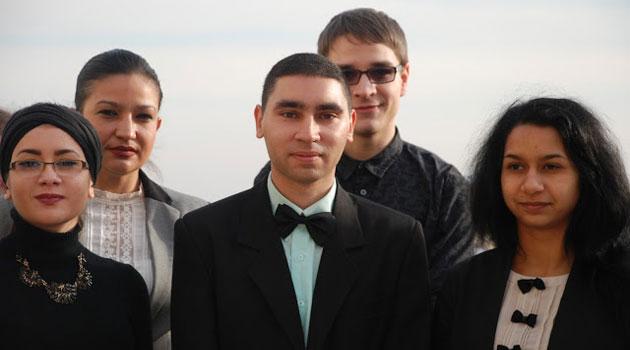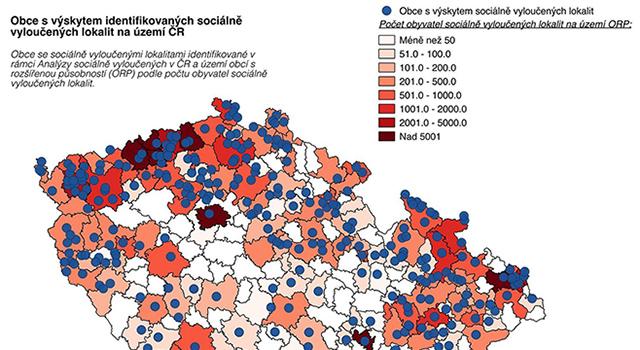Half of the Roma in the Czech Republic live in social exclusion, members of the middle class face ethnic intolerance

Half of the Romani people living in the Czech Republic are socially excluded. According to qualified estimates made by the coordinators for Romani minority affairs who work at local and regional level, that is more than 113 000 people.
In the Moravian-Silesian and Ústí Regions, two-thirds of the Romani residents have ended up on the outskirts of society. Those are the findings of a report on the state of the Romani minority in 2015 that was slated to be discussed by the Czech Government last Thursday.
Romani people are the most numerous national minority in the Czech Republic. According to estimates by the coordinators, there are a total of 226 300 members of this community in the Czech Republic.
Roughly 2 % of the population of the Czech state, therefore, is Romani. In the EU as a whole there are around six million Romani inhabitants.
Compared to other EU countries, the Romani minority in the Czech Republic is not large – in neighboring Slovakia, for example, Romani people represent nine percent of the total population. “Roughly half of the Romani people in the Czech Republic are integrated into society. The other half are socially excluded or at risk of social exclusion. They are marginalized and pushed to the outskirts of society,” the report says.
According to the report, ethnic “discrimination, intolerance and prejudice” from some people is faced by Roma in the Czech Republic even if they have graduated from college, are successful in their employment, have sufficient incomes, and are financially solvent. These people represent a Romani intelligentsia and middle class, the report says.
Romani people frequently end up living on the periferies of cities and villages in residential hotels, according to the report, and in the past local authorities have often orchestrated the relocation of Romani families into one specific area. Romani tenants’ access to regular housing is restricted in practice.
Romani people in this situation are indebted and live on welfare. According to a Government-commissioned analysis, the number of impoverished people living in certain apartment buildings, streets and quarters doubled between 2006 and 2014 in the Czech Republic.
That number grew from 300 such socially excluded localities in 2006 to 600 in 2014. The number of persons living in such localities also increased from 80 000 to approximately 115 000 by the end of 2014.
Most of the socially excluded are Romani people in particular. Their population is most concentrated in the Moravian-Silesian and Ústí Regions.
In the Ústí Region, according experts’ estimates, there live around 58 300 Roma, comprising 7 % of the population of that region, while in Moravia-Silesia there are 33 200 Roma representing approximately 3 % of the total regional population. Two-thirds of the Romani inhabitants of those regions are now grappling with exclusion.
The situation for Romani people is best in Prague, where only 17 % of Roma are excluded. In the Pardubice and Zlín Regions about one-third of the Romani inhabitants are excluded, while in the rest of the regions of the Czech Republic, half of the Romani inhabitants are excluded.
The authorities do not keep official statistics about Romani people’s representation in various areas of life. It is not, therefore, clear how many Romani people are unemployed, for example.
The Czech economy is growing and unemployment in the country is falling. According to this new report, it can therefore be presumed that Romani employment improved last year also.
The report also assesses Romani education, health and security. It references the adoption of an amendment to the Schools Act that is supposed to support the inclusion of all children into mainstream schools.
The proportion of Romani children in so-called “special schools” is much higher than for children of any other ethnic group, according to the report. Romani people living in ghettos also have worse health outcomes.
Last year the Czech state spent a total of CZK 66 950 000 (EUR 2 477 500) on Romani integration. That funding was divided between the Culture Ministry, Education Ministry, Regional Development Ministry, and the Office of the Government.
The money was spent, for example, on supporting Romani coordinators at local and regional level or on social work. Even though this was the highest amount of investment into Romani integration in the last three years, it still did not equal the investments of previous administrations.
In the year 2010, CZK 86 710 000 (EUR 3,208,694) was spent on Romani integration, roughly CZK 1.7 million (EUR 62 910) less than that was spent in 2011, and around CZK 76 470 000 (EUR 2,829,826) was invested in 2012. During 2013 the amount fell to CZK 63 070 000 (EUR 2 333 950).
